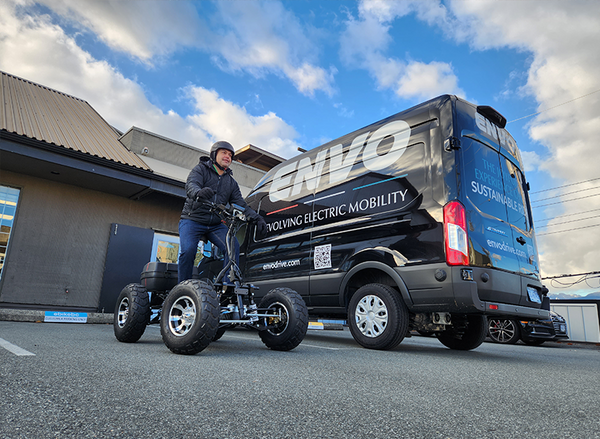Introduction:
In recent years, there has been a significant shift towards electric vehicles (EVs) as a cleaner and more sustainable mode of transportation. Electric cars and motorcycles have gained popularity, but what about their off-road counterparts? Can electric all-terrain vehicles (ATVs) truly compete with their gas-powered counterparts? In this blog post, we will delve into the viability of electric ATVs and explore their potential in the world of off-road adventure.
The Rise of Electric Vehicles:
The rise of electric vehicles can be attributed to the growing environmental concerns and the need to reduce greenhouse gas emissions. Electric cars have become a common sight on the roads, offering improved efficiency and lower carbon footprints. The same principles that apply to electric cars can be applied to off-road vehicles as well, giving birth to the concept of electric ATVs.
ENVO eATV, Learn More
Advantages of Electric ATVs:
-
Environmental Friendliness: One of the most significant advantages of electric ATVs is their minimal environmental impact. They produce zero tailpipe emissions, helping to reduce air pollution and contributing to a greener future.
-
Quieter Operation: Electric ATVs operate much quieter compared to their gas-powered counterparts. This aspect not only reduces noise pollution but also allows for a more peaceful and immersive off-road experience.
-
Instant Torque: Electric motors deliver instant torque, providing quick acceleration and responsive power delivery. This feature can enhance the ATV's performance, allowing for better control in challenging terrains.
-
Low Maintenance: Electric ATVs have fewer moving parts and require less maintenance than traditional gas-powered ATVs. There are no oil changes or spark plugs to worry about, resulting in reduced maintenance costs and time spent on upkeep.
-
Customizability: Electric ATVs offer the opportunity for customization and personalization. With the absence of a traditional engine, manufacturers can experiment with innovative designs, creating lightweight and sleek electric ATVs.
Challenges and Limitations:
While electric ATVs have many advantages, there are still some challenges and limitations to consider:
-
Limited Range: Electric ATVs currently have limited range capabilities due to the constraints of battery technology. Off-roading often involves long distances and unpredictable terrains, requiring extended battery life to ensure uninterrupted adventures.
-
Charging Infrastructure: The availability of charging infrastructure is a crucial factor for the success of electric ATVs. The establishment of a widespread and accessible charging network in remote off-road areas is necessary to support their use effectively.
-
Weight and Power: The current battery technology used in electric ATVs adds significant weight, affecting the overall power-to-weight ratio. This can impact the ATV's performance, especially when climbing steep inclines or navigating challenging trails.
-
Initial Cost: Electric ATVs are generally more expensive than their gas-powered counterparts. However, as technology advances and economies of scale come into play, the costs are expected to decrease, making them more accessible to a wider audience.
The Future Outlook:
Despite the challenges, the future of electric ATVs looks promising. As technology continues to advance, we can expect improvements in battery capacity, leading to longer ranges and enhanced performance. The development of faster-charging solutions and the expansion of charging infrastructure will also contribute to the viability of electric ATVs.
Furthermore, increased environmental consciousness and stricter emissions regulations may drive more people towards electric ATVs as a sustainable alternative. As the market demand grows, manufacturers will likely invest more resources in research and development, further pushing the boundaries of electric ATV technology.
Conclusion:
While electric ATVs face certain limitations, their advantages, including environmental friendliness, low maintenance, and instantaneous torque, make them a viable option for off-road enthusiasts. As technology continues to evolve and charging infrastructure expands, electric ATVs have the potential to become a common sight on trails and adventure destinations worldwide. With their clean and silent operation, they not only offer thrilling off-road experiences but also pave the way for a more sustainable future in the realm of all-terrain vehicles.





































